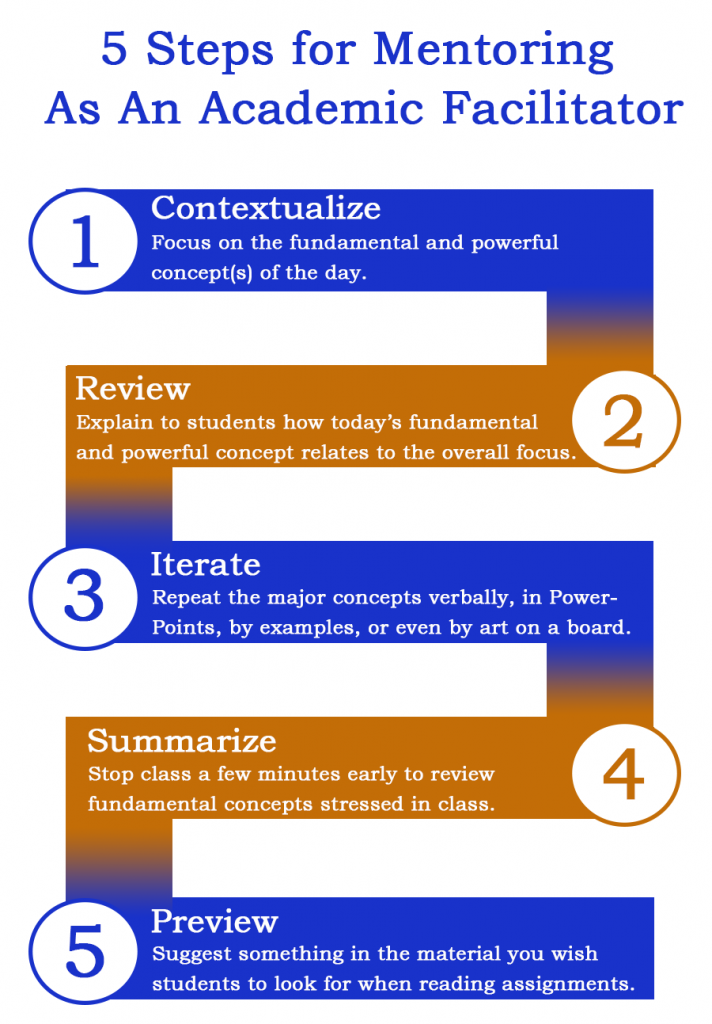Perhaps in the most pedestrian of roles, the mentor functions as facilitator both inside and outside the classroom. Inside, the mentor is responsible for running all the classroom sessions. Sometimes that involves a leadership role, and other times it means designating students to take the lead. (Tweet this quote.) Most importantly, the mentor is the chief organizer, figuring out the course’s student learning outcomes (SLOs), aligning those with department/university/college or general education goals, deciding on what happens each day, and developing both a grading and an assessment plan to see if those goals were indeed achieved.
As a micro-manager, the facilitator must organize each class session around a five-part scheme Hal and I call “Keeping It C.R.I.S.P.” (2008):
- Contextualize. Focus on the fundamental and powerful concept(s) of the day. Put them on the board, write them out in handouts, and show them in PowerPoints: e.g., “Today we’ll be discussing method of narration.”
- Review. Explain to your students how today’s fundamental and powerful concept relates to the course’s overall focus, especially its SLOs: e.g., “Method of narration is one of Aristotle’s basic elements of literature, and ‘Students will demonstrate their understanding of the basic elements of literature by composing fiction and poetry’ is a course and department SLO.”
- Iterate. Repeat the major concepts verbally, iconicly in PowerPoints, by examples, or even by art on a board. The more emphasis the mentor places on a concept, the more students recognize its importance and are apt to learn it: e.g., “Remember when we read Hemingway’s ‘The Short, Happy Life of Francis Macomber’ how toward the end he even switched his method of narration to the point of view of the lion’s brain?”
- Summarize. The facilitator doesn’t wait until after the bell to yell at fleeing students, but stops class a few minutes early to review those fundamental and powerful concepts stressed in class: e.g., “While today we discussed method of narration, we got through only the first person point of view, and we learned that such narrators are not reliable—not necessarily to be believed.”
- Preview. Don’t just rely on the syllabus telling the students to read Chapter VII or the next story. Suggest something in the material you wish them to be looking for: e.g., “When you read Poe’s ‘Ligeia,’ pay close attention to the narrator and see if you can find any statements that suggest he is indeed unreliable.”

Inside and outside the class, the mentor is also a problem-solver, whether figuring out when to meet with a particular student or suggesting an article that might help the student answer a posed question. The mentor applies judgment in deciding how much help a student needs and the best ways of providing it (e.g., dropping by the office for a conference or going to the writing lab for additional help). Outside the class, the mentor responds both to the big picture and small steps, from student visits and emails to figuring out a specific in-class activity that will help the students learn.
The mentor, then, is a manager of the learning experience. (Tweet this quote.)
Author
 Charlie Sweet is currently Co-Director of the Teaching & Learning Center (2007+) at Eastern Kentucky University. Before going over to the dark side of administration, for 37 years he taught American Lit and Creative Writing in EKU’s Department of English & Theatre, where he also served as chair (2003-2006). Collabo-writing with Hal Blythe, he has published well over 1000 items, including 15 books; of his 11 books with New Forums. Meet Charlie.
Charlie Sweet is currently Co-Director of the Teaching & Learning Center (2007+) at Eastern Kentucky University. Before going over to the dark side of administration, for 37 years he taught American Lit and Creative Writing in EKU’s Department of English & Theatre, where he also served as chair (2003-2006). Collabo-writing with Hal Blythe, he has published well over 1000 items, including 15 books; of his 11 books with New Forums. Meet Charlie.



